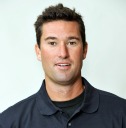
It’s the final set and you need to hold serve to keep the match going. To make matters worse, you lost the last three games, the wind is picking up and a line call just went against you. It would be easy to surrender to frustration and lack of energy, but this is the opportunity to showcase mental toughness.
How are mentally tough players able to repeatedly overcome adversity during a match? The answer lies in a mindset established before the first ball is put in play and lasts throughout the competition. The player focuses on “playing” tennis, rather than reacting to the ever-changing score. This process-oriented attitude allows mentally tough athletes to maintain a consistent level of effort, attention and energy, regardless of the situation. It allows them to overcome opponents who get caught up in the win/loss column and other distractions.
Winning is very important to tough-minded players, but they also understand a steady process leads to desired results. They believe establishing “keys to performance” provides them every opportunity to beat opponents in difficult situations. Focusing on results hinders motivation, resiliency and effort, causing many players to fold when their back is against the wall. Outcome-oriented thoughts drain limited the energy and attention resources necessary to obtain peak performance.
Keys to performance serve as a reminder of how to win each point during the match. Process-oriented thoughts allow the athlete to stay in the moment and maximize potential by placing an emphasis on effort. Positive mental refreshments allow the player to prevail in all situations. Examples include:
-
“Keep moving your feet”
-
“Play in rhythm”
-
“Be aggressive with each point”
-
“Focus on specific targets throughout the match”
-
“Regroup between points and stay in control”
The duration and intensity of these thoughts differentiates competitors at the highest level. Process-oriented thoughts help channel useful information to the body.
Elite players feel the magnitude of the moment, but they thrive on executing a plan and being fully engaged with each shot. There is a time and place to dwell on bad breaks, difficult conditions and other excuses, but not during the heat of a match.
About Matt Cuccaro, Ed.M.

Matt Cuccaro is the Director of Mental Training at Ivan Lendl International Junior Tennis Academy on Hilton Head Island, S.C. Matt has a Master’s of Education in Counseling/Sport Psychology from Boston University and is an active member of the Association for Applied Sport Psychology. Matt has worked with individuals in a number of sports ranging from the junior level to world-class professional athletes.
About Adam Naylor, Ed.D., CC-AASP

Dr. Naylor, mental training consultant, brings 15 years of experience in developing tennis players to the Ivan Lendl IJTA team. Over the course of his career he has educated regional, national and international competitors – including ATP and WTA professionals, collegiate players, ITF and USTA junior competitors. He currently leads Telos Sport Psychology Coaching and is the Director of the Boston University Athletic Enhancement Center.
For more information:
www.LendlTennis.com/info, 888.936.5327.